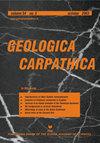Cyclicity of Middle Jurassic calciturbidites of the Travnik Formation, Bovec Basin, NW Slovenia
IF 1.5
4区 地球科学
Q4 GEOSCIENCES, MULTIDISCIPLINARY
引用次数: 0
Abstract
We investigate calciturbidite cyclicity using statistical method based on time-series analysis (Fourier analysis) of bed thickness patterns. This method was applied to four members of the Jurassic calciturbidite-dominated Travnik Formation of the Bovec Trough outcropping in three adjacent and correlated sections. Our study has shown that the Fourier analysis of calciturbidite bed thicknesses is not successful for reconstruction of cyclicity in erosional upper slope depositional environments (Member 3). On the contrary, the method shows meaningful results for lower slope and distal basin floor depositional setting (Members 1, 2, 4). Here we detected variability of cyclicity in the same time frame of deposition and also subtle lateral variation of the stacking pattern between different sections. Each section contains regional lowfrequency cycles common to all sections, and superimposed specific “local” high-frequency cycles. Tectonic factors have an influence on the low frequency, and other factors, such as the local topography, climate, different position on a depositional lobe or magnitude of the turbidite event, can force the high-frequency cycles. We calculated nine cycles for Bajocian and Bathonian (Members 1 and 2), and also nine cycles from Early Callovian to Middle/Late Oxfordian (Member 4). Due to the erosional nature of the Member 3 (Bathonian to Early Callovian) sedimentary environment, reliable comparison to Jurassic sea-level variations was not possible.斯洛文尼亚西北部Bovec盆地Travnik组中侏罗世钙质浊积岩的周期性
我们使用基于床层厚度模式的时间序列分析(傅立叶分析)的统计方法来研究钙浊积岩的旋回性。该方法适用于Bovec海槽侏罗系钙浊积岩主导的Travnik组的四个成员,在三个相邻和相关的剖面中露头。我们的研究表明,钙浊积岩层厚度的傅立叶分析无法成功重建侵蚀上坡沉积环境中的旋回性(成员3)。相反,该方法在较低的斜坡和远端盆地底部沉积环境中显示出有意义的结果(成员1、2、4)。在这里,我们检测到了沉积同一时间段内旋回性的变化,以及不同剖面之间堆叠模式的细微横向变化。每个部分都包含所有部分共有的区域低频周期,以及叠加的特定“局部”高频周期。构造因素对低频率有影响,而其他因素,如当地地形、气候、沉积波瓣上的不同位置或浊积岩事件的大小,可以迫使高频循环。我们计算了Bajocian和Bathonian的9个旋回(成员1和2),以及从早卡洛阶到中/晚牛津阶的9个周期(成员4)。由于第3段(巴通阶至早卡洛维阶)沉积环境的侵蚀性质,无法与侏罗纪海平面变化进行可靠比较。
本文章由计算机程序翻译,如有差异,请以英文原文为准。
求助全文
约1分钟内获得全文
求助全文
来源期刊

Geologica Carpathica
地学-地球科学综合
CiteScore
2.40
自引率
23.10%
发文量
26
审稿时长
>12 weeks
期刊介绍:
GEOLOGICA CARPATHICA covers a wide spectrum of geological disciplines including geodynamics, tectonics and structural geology, volcanology, stratigraphy, geochronology and isotopic geology, karstology, geochemistry, mineralogy, petrology, lithology and sedimentology, paleogeography, paleoecology, paleobiology and paleontology, paleomagnetism, magnetostratigraphy and other branches of applied geophysics, economic and environmental geology, experimental and theoretical geoscientific studies. Geologica Carpathica , with its 60 year old tradition, presents high-quality research papers devoted to all aspects not only of the Alpine-Carpathian-Balkanian geoscience but also with adjacent regions originated from the Mediterranean Tethys and its continental foreland. Geologica Carpathica is an Official Journal of the Carpathian-Balkan Geological Association.
 求助内容:
求助内容: 应助结果提醒方式:
应助结果提醒方式:


